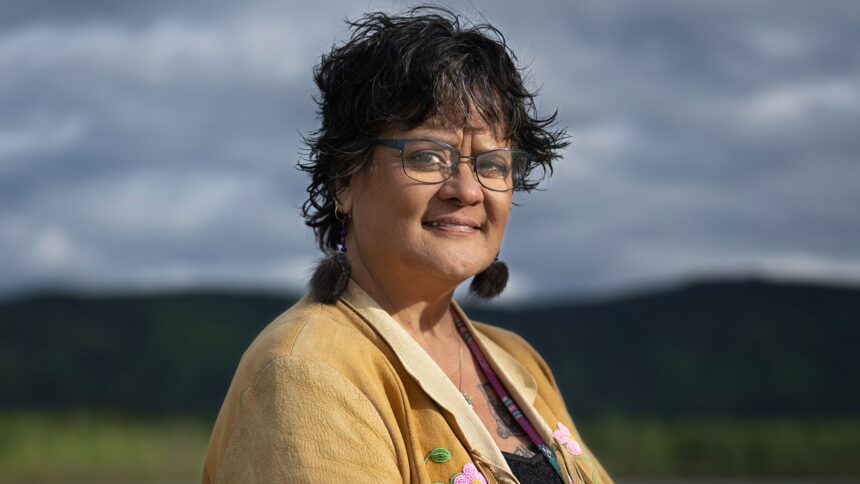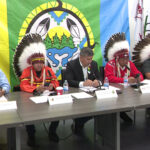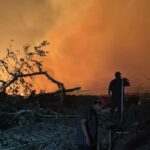A First Nation in the Yukon and the territory’s mining lobby is pushing back against the government’s proposed changes to its minerals legislation. “We have carefully reviewed (the Yukon government’s) draft framework with our leadership staff and advisors, and we just could not support it,” First Nation of Na-Cho Nyäk Dun Chief Dawna Hope told APTN News. The territory is currently in the process of developing new minerals legislation in partnership with First Nations. The new legislation will replace the Quartz Mining Act and Placer Act, which have been in place for more than a century. According to the government, it aims to strengthen the management of the territory’s mineral resources in a way that respects First Nations’ rights, protects the environment and supports industry. The draft framework is being led by a steering committee composed of Yukon government officials, First Nations and other Indigenous representatives, including Na-Cho Nyäk Dun. But Hope said the framework, which was tabled earlier this summer, falls short of delivering the sweeping changes her nation feels is desperately needed to improve the territory’s mining laws. “At its core, Yukon government’s framework did not reflect the fundamental overhaul of Yukon mining’s regime that is required in respect of our Aboriginal rights and treaties,” she said. Hope said she couldn’t comment on specifics as the framework is embargoed, something she described as “frustrating,” and is encouraging those interested in learning more to ask the government or the steering committee to release the First Nation from its confidentiality obligations. The First Nation said in a prior release it feels the government and industry stands to benefit by maintaining the status-quo. Those benefits, Hope said, often come at the expense of her First Nation’s interests and its final agreement. “I think that they are just continuing to allow the industry to work in an antiquated landscape,” she said. Hope said the framework is especially disappointing as her First Nation continues to grapple with the impacts of the Eagle gold mine disaster. Na-Cho Nyäk Dun has accused the government of having a major hand in the matter by failing to enforce proper regulatory oversight. “The Eagle catastrophe showed us how much it can cost when mining is not done responsibly on both the environmental and the economic side,” she said. Yukon Chamber of Mines weighs in on framework ‘Things have moved a long way in the last 100 years, and so I would like to see us focus on the areas that still require improvement,’ says Jonas Smith of the Yukon Chamber of Commerce. Photo: APTN. The Yukon Chamber of Mines is likewise raising issues with the framework, albeit for entirely different reasons. Executive director Jonas Smith said the chamber can’t support the framework because it doesn’t feel it’s been adequately engaged in its drafting. He also said there are issues surrounding its consultation schedule as the chamber’s members are typically out in the field during the summer months. “There’s a significant interest from some of the parties at the table to complete this prior to the fall (territorial) election call, and our members are very busy this time of year,” he said. “People are trying to earn a year’s wages in a three-month season.” While Smith likewise couldn’t go into specifics, he said the framework’s proposals would impact mineral exploration and development. He also noted some changes aren’t necessarily specific to mining. “There are certain conventions that industry follows around the world that are important, particularly if we’re going to remain competitive,” he said. Smith said there are also concerns that representatives drafting the legislation are largely consultants or lawyers as opposed to experts in the mining industry. “We do want to make sure that the operational elements are informed by experience and expertise,” he said. Smith said the chamber ultimately agrees the current legislation isn’t working. “Things have moved a long way in the last 100 years, and so I would like to see us focus on the areas that still require improvement,” he said. “We would like to see it done quickly, because at the end of the day, the industry requires certainty in order to remain competitive internationally.” Framework is a collaborative approach, says government Cabinet spokesperson Laura Seely said in a statement that the framework isn’t a “Yukon government-alone effort” and is reflective of “ongoing discussions and contributions from many partners.” “Everyone around the table brings different perspectives and priorities. While this can make the dialogue challenging at times, ultimately, we believe it will strengthen the framework and new minerals legislation,” she said. She added that the embargo was agreed to by all parties “as usual with any negotiation document.” The government said while there are now talks of lifting the embargo, that decision would be made by the steering committee. “The Framework is a collaborative, government-to-government initiative,” the statement reads. “As such, any decisions—including the embargo—require agreement from all parties. “This is not solely a Yukon Government decision, and discussions are still underway as we work together to finalize the approach in a collaborative manner.” Meanwhile, Hope said her First Nation supports responsible mining as long as it doesn’t come at the expense of its rights, the environment and human safety. “We cannot afford to send any more failed or abandoned mines to our future generations,” she said. The First Nation said it’s now implementing its own mining policy for its territory moving forward. Last week, Na-Cho Nyäk Dun warned that any new staking on its traditional territory as it enters into land use planning negotiations with the government is “unlawful” and threatened to take legal action against those attempting to pursue mineral rights. Mines Minister John Streicker, however, said the government retains legal authority over non-settlement lands until a land use plan is approved. Na-Cho Nyäk Dun and the government have not yet reached consensus on interim staking withdrawals. Continue Reading
First Nation in Yukon, chamber of mines pans territorys proposed changes to mining legislation

Leave a Comment










